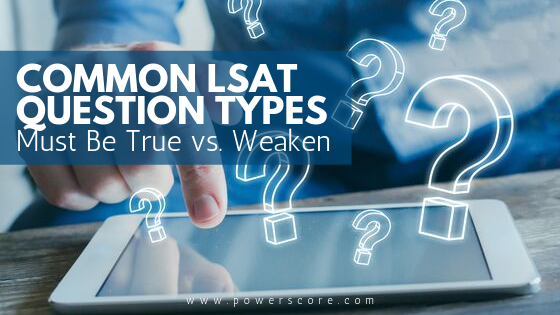Blog.powerscore.com Lsat How-to-handle-evenif-evenif-it-doesnt-matter
You are here: Home / Logical Reasoning / Common LSAT Question Types: Must Be True vs. Weaken

When approaching Logical Reasoning on the LSAT, I think most students clearly recognize the importance of(1) understanding the unique properties of individual question types, and (2) having dedicated strategies to consistently apply when faced with a particular type of question. That is the value in knowing how to recognize, say, a Parallel Reasoning question, and then understanding the proper approach to take when attacking Parallel Reasoning.
Make no mistake about it: the ability to distinguish different types of questions from one another is crucial to success on test day. However, as important as it is to identify what makes one question type different from another, it is also extremely important to understand the similarities between question types , and that is what I want to discuss here.
Must Be True vs. Weaken
One of the most surprising relationships on the LSAT exists between Must be True questions and Weaken questions. I say their similarities are "surprising" because at first glance these two questions seem to be presenting almost completely opposing tasks: Must be True questions ask you to use stimulus information to prove that an answer choice is true, whereas Weaken questions ask you to use an answer choice to attack the argumentation in the stimulus, essentially showing that the conclusion is not necessarily true. But consider both question types from a broader, argumentation-based viewpoint, and some striking consistencies begin to emerge.
Must Be True
Think about what makes an answer choice incorrect in a Must be True question. Individually it can be any one of a number of errors—new information not addressed in the stimulus, information that is stronger or more exaggerated than the support given in the stimulus, an improper comparison of stimulus elements where the relationship cannot be definitively known, etc.—but collectively they can all be summed up as "information that is not guaranteedbased on the stimulus." In other words, wrong answers in MBT are all just invalid conclusions; we cannot know that an answer choice is 100% certain, so in LSAT terms it is not true.
Weaken
Now let's look at things from a Weaken perspective. What is it about an argument in a Weaken stimulus that allows it to be attacked? Well, individually, arguments can be vulnerable for a number of reasons—an author relies upon incomplete evidence or draws a conclusion containing new information, the conclusion is qualified/limited in some way that leaves it open to attack, the author attempts to compare two or more items whose relationship cannot be clearly known, etc.—but collectively, vulnerable (or invalid) arguments are ones where the author's conclusion is notguaranteedbased on the premise information. Exceptions to the conclusion could exist, and the correct answer in Weaken simply provides evidence of the possibility of some exception.
Hopefully as you consider the previous two paragraphs you'll notice the rather remarkable degree of similarity between incorrect answer choices in Must be True questions, and conclusions as given in Weaken stimuli. In all cases some element within them cannot be known with certainty, and thus they are invalid. And this consistency becomes even more useful/powerful once you realize that thereasonsthat they cannot be completely known are often the same, as I've tried to illustrate with the specific errors listed above.
Adapt Your Preparation
This realization should serve a number of different purposes as you continue to prepare. For one, you should begin to treat any and all argumentation on the LSAT the same way that you treat Must be True answer choices: with skepticism. Always ask, "Why?" when presented with an author's opinion—"Why does the author believe this? Why should I believe this?"—and do not accept that opinion until you are completely satisfied that the evidence provided shows that the conclusion must occur in the way the author believes that it will. When you encounter a questionable conclusion, and you understand exactly why it is uncertain, you are in the perfect position to manipulate that argument!
And secondly, you should find that as your abilities improve in one area, that success will translate into improvements in other areas as well. As you become more adept at eliminating Must be True answers, you should find that you are also better at recognizing vulnerabilities in argumentation and choosing answers that exploit those vulnerabilities (correct answers in Weaken), or eliminate those vulnerabilities (correct answers in Strengthen, Assumption, and Justify). And vice versa: the more skilled you becoming at spotting questionable arguments, the more skilled you become at spotting incorrect Must be True answers.
So while you work hard to correctly identify and attack each individual question type, don't overlook the benefits gained by understanding the consistencies they share.
Jon Denning is PowerScore's Vice President and oversees product creation and instructor training for all of the exam services PowerScore offers. He is also a Senior Instructor with 99th percentile scores on the LSAT, GMAT, GRE, SAT, and ACT.
Jon is widely regarded as one of the world's foremost authorities on LSAT preparation, and for the past decade has assisted thousands of students in the law school admissions process. He has also created/co-created a number of PowerScore's LSAT courses and publications, including the Reading Comprehension Bible, the In Person, Live Online, and On Demand LSAT Courses, the Advanced Logic Games Course, the Advanced Logical Reasoning Course, and a number of books in PowerScore's popular LSAT Deconstructed Series.
Blog.powerscore.com Lsat How-to-handle-evenif-evenif-it-doesnt-matter
Source: https://blog.powerscore.com/lsat/common-lsat-question-types-must-be-true-vs-weaken/
Posted by: ackerfainjusly.blogspot.com

0 Response to "Blog.powerscore.com Lsat How-to-handle-evenif-evenif-it-doesnt-matter"
Post a Comment